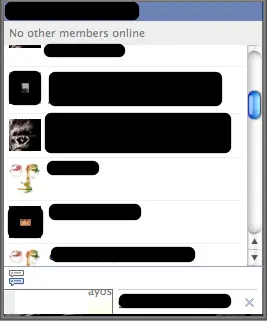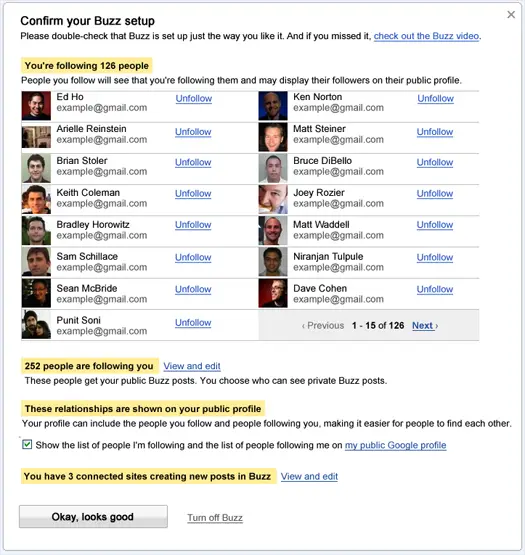 So Google Plus (Google+) is quickly amassing its own number of followers, although it’s probably still a far cry from the number of Facebook users. In less than a month since the launch of Google+, we’ve been seeing a lot of speculations about the number of users. From 10 million to 25 million Google+ users – the numbers are all over the place. Google will probably never tell us the real deal on how many users they have, but there is something more important than knowing just how many people are on the social network. Privacy. [Read more…] about How to Configure Privacy Settings on Google+
So Google Plus (Google+) is quickly amassing its own number of followers, although it’s probably still a far cry from the number of Facebook users. In less than a month since the launch of Google+, we’ve been seeing a lot of speculations about the number of users. From 10 million to 25 million Google+ users – the numbers are all over the place. Google will probably never tell us the real deal on how many users they have, but there is something more important than knowing just how many people are on the social network. Privacy. [Read more…] about How to Configure Privacy Settings on Google+
Privacy
Obama Administration Targets Online Privacy
 Protecting one’s privacy is perhaps one of the biggest issues that “online dwellers” face today. With everyone and their mom spending a considerable amount of time online on a daily basis, it is inevitable for privacy issues to crop up left and right. We don’t even have to talk about Facebook, and privacy is already a big issue.
Protecting one’s privacy is perhaps one of the biggest issues that “online dwellers” face today. With everyone and their mom spending a considerable amount of time online on a daily basis, it is inevitable for privacy issues to crop up left and right. We don’t even have to talk about Facebook, and privacy is already a big issue.
Naturally, a problem that exists on such a large scale is bound to catch the attention of the big wigs. So now, the Obama administration is embarking on a project to regulate Internet privacy. There are no concrete details as of yet, but The Wall Street Journal reports that the U.S. Commerce Department is due to release a report soon. More than spewing out a report, though, the government has already created a task force that will ensure that the recommendations from the report will be converted into policy.
The United States is rather a late comer in this regard. Other countries such as the United Kingdom, Germany, and Canada have had systems in place to protect the online privacy of their citizens. Surprisingly, there is a serious lack of a comprehensive system in the U.S. – well, until now.
Naturally, there are opposing views on this move. On the one hand, we have people like Rep. Joe Barton who says: “Better late than never. I am glad more and more folks, in the government and otherwise, are beginning to realize that there is a war against privacy.”
On the other hand, entities such as the Interactive Advertising Bureau are not too happy with the idea of having new laws as they believe that they already employ sufficient measures to ensure the privacy of consumers.
Let me ask you – do you think new laws are necessary to address privacy issues in America?
My Facebook Groups Experience: Head’s a-Spinning
A week or so ago, we heard about Facebook Groups, one of the new features rolled out by the social network. Some people were excited, some were skeptical, while others simply didn’t care. To be honest, I read a bit about it and then totally threw the idea out of the window. I just couldn’t be bothered.
Over the weekend, I received two notifications that caught my eye – I was added to groups by friends. I didn’t really pay any attention until this morning, and I what I experienced made my head spin. Seriously.
This is one of the groups I was added to:
 So what’s up with the “Secret Group” tag? When someone creates a Group, he or she can set it to secret so as to hide it from everyone else. Duh. Seriously, though, this setting is perfect for those who are really careful about their privacy. People who are not in the group cannot “see” it anywhere, and they have to be invited by someone else who is already in that group. This brings up an interesting flaw: if anyone can add friends to the group, doesn’t this defeat the purpose of keeping security tight? I think that to make this more efficient, only administrators/creators should be able to “approve” membership.
So what’s up with the “Secret Group” tag? When someone creates a Group, he or she can set it to secret so as to hide it from everyone else. Duh. Seriously, though, this setting is perfect for those who are really careful about their privacy. People who are not in the group cannot “see” it anywhere, and they have to be invited by someone else who is already in that group. This brings up an interesting flaw: if anyone can add friends to the group, doesn’t this defeat the purpose of keeping security tight? I think that to make this more efficient, only administrators/creators should be able to “approve” membership.
Another thing that made me go “wut?” was the way people in groups can interact. The Group’s page is pretty much like any other page or wall on Facebook, but when posting comments, there does not seem to be a button to click – just hit ENTER. More so, there isn’t a way to delete your comment. What if you made a grammar mistake??? Seriously, what if you want to change what you just posted? You can, however, unsubscribe to a specific post if you don’t want to receive notifications regarding it anymore.
Last thing I tried was the chat. It’s basically a group chat, with all the online members receiving the messages. I think it is still buggy (when is Facebook Chat not buggy anyway) as it does not show the members who are online. When I sent a message, though, they received it and a chat session was begun. (Bear with me with all those black boxes, please.)
So why is my head spinning? I guess because no one in the Group really understood what it was for. We do have a binding factor, but as of the moment, no one can figure out what we can use the Group for. We will figure this out somehow, but I don’t see the need for it right now.
Anyone care to share their Facebook Groups experience? Is it working out for you guys?
Internet Surveillance in America’s Future?
 Talk about Big Brother. As if the capability to run (legal) wiretaps weren’t enough, the United States government is now aiming to set in place systems that would allow them to (legally) wiretap electronic communication such as e-mail and Facebook messages! What the Congress wants is that if the government sends a provider a wiretap order, they should be able to provide the required information.
Talk about Big Brother. As if the capability to run (legal) wiretaps weren’t enough, the United States government is now aiming to set in place systems that would allow them to (legally) wiretap electronic communication such as e-mail and Facebook messages! What the Congress wants is that if the government sends a provider a wiretap order, they should be able to provide the required information.
The implications are huge. Bottom line: anything you send online (whether you’re using a wired connection or a wireless one) can be retrieved and reviewed.
Of course, the average person should not have anything to hide (aside from potentially embarrassing private messages), but the idea that the government can take a look at private information/communication if it wishes is not something that people will welcome any time soon. From a technical point of view, this proposition also poses a lot of risks. According to James X. Dempsey, Vice President of the Center for Democracy and Technology, the government is “asking for the authority to redesign services that take advantage of the unique, and now pervasive, architecture of the Internet. They basically want to turn back the clock and make Internet services function the way that the telephone system used to function.”
The underlying reason for the government’s plan is that the Internet is being used as a venue for communication by terrorists and other individuals/groups that are threats to society. If they have the ability to monitor and scrutinize this venue, then the world might just be safer for it. While this is indeed a serious concern, I am not so sure that wiretapping is the best solution. The system might just open up a whole new can of worms.
What do you think?
Google Wants You to (Re)Confirm Buzz Privacy Settings
True to what has been reported a couple of hours ago, Google has started asking Buzz users to confirm the new Buzz privacy settings. You’ll get the notification page the next time you click on the Buzz tab on your Gmail account.
Google also explained why they are asking Buzz members to confirm their privacy settings again. According to a post on the Official Google Blog – “we quickly realized we didn’t get everything right and moved as fast as possible to improve the Buzz experience. ”
Google has been making a number of changes since issues on privacy started to escalate such as replacing the auto-follow with suggestions for people to follow instead. The good thing about this setup is that Buzz users are given the freedom to choose people that they will follow.
Now, this is well and good for new Buzz users after the new privacy policy was implemented. But for those who started using Google Buzz earlier, the auto-suggest may not have worked. So, Google is issuing the Google Buzz confirmation page again to ensure that old users are given a chance to change their privacy settings or accept these settings as it is.
The confimation page is the same privacy settings page given when you first activated Google Buzz. When you get it now, you are free to edit, unfollow and follow people before finally accepting it.
So, are you going to accept the new Google Buzz privacy settings? Or have you totally deactivated Google Buzz already?
Facebook Takes a New Step in Site Governance
 Recently, Facebook has published some updates to its statement of site governance. These updates aim to maintain users’ control over privacy and the things they share on Facebook. Here’s a quick look at the salient features of the proposed changes to Facebook’s Site Governance Page.
Recently, Facebook has published some updates to its statement of site governance. These updates aim to maintain users’ control over privacy and the things they share on Facebook. Here’s a quick look at the salient features of the proposed changes to Facebook’s Site Governance Page.
On Location – Facebook might soon introduce a new feature that will let you add a place to something you post. By place, Facebook means a page for a local restaurant instead of the actual geotag of its location. More details and other privacy controls about this feature will be rolled out in the coming days.
On Sharing and Connections – Facebook is also clarifying on how members connect with people, places and things that are important and how this information and content are shared with friends and other people. Right now, Facebook members share photos or links on their profile and can control who can access those. Facebook will change some wording to further clarify these policy.
On Applications and Third-Party Websites – Facebook will soon be proposing a new privacy policy that would offer more personalzied experience when visiting and sharing third-party websites that are featured on Facebook.
Other Policy Changes – Facebook is also explaining the series of smaller changes on different aspects of Facebook including why invitations that a non-user receives to join Facebook sometimes include the names of other people besides the person who invited them, as well as a thorough explanation of the “Everyone” setting. The new policy changes also explain how people can sync their contact lists on mobile devices and other contact management services.
Here’s the link to the proposal: Facebook Site Governance policy.


